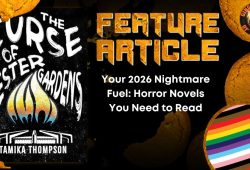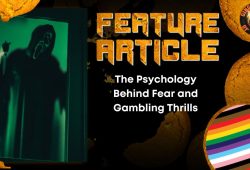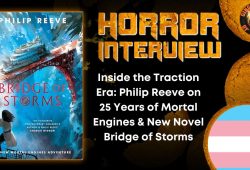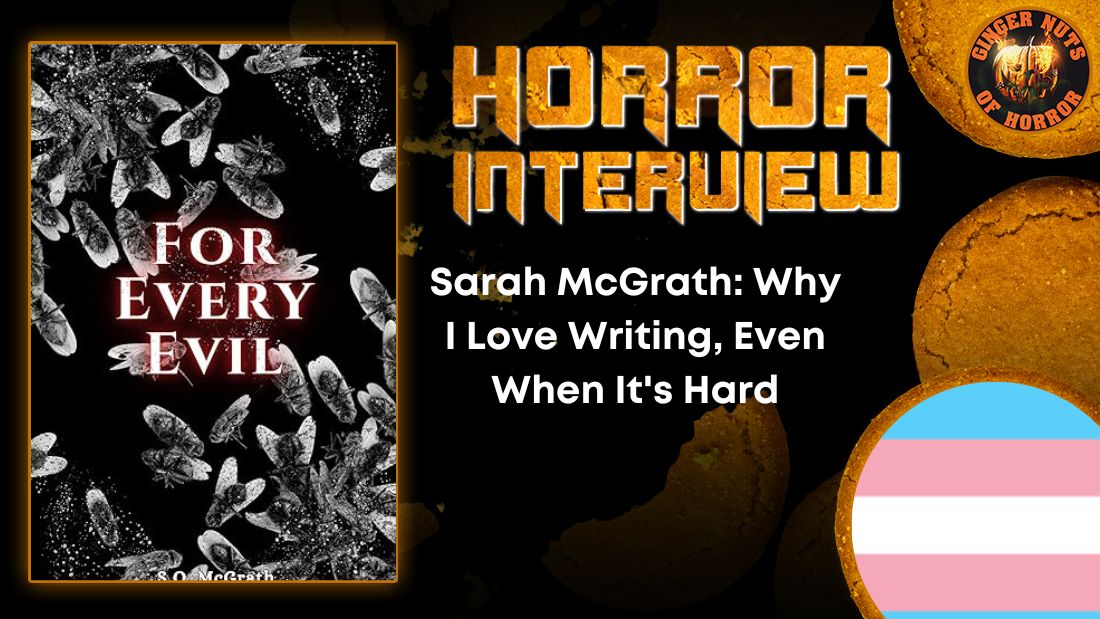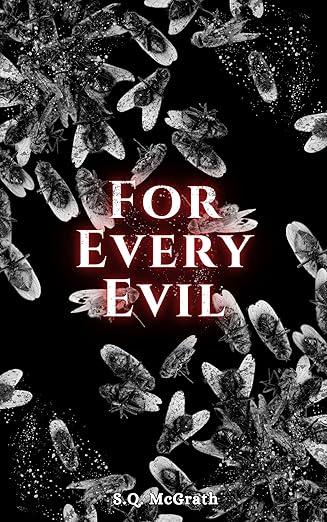Sarah McGrath: Why I Love Writing, Even When It’s Hard
Please tell the readers a little bit about yourself.
Ah, the dreaded “put your whole person into a few sentences” question. I’m all sorts of things,
but at my core I’m a storyteller. I have been writing for three decades; I completed my first
novella at eighteen and am now on my twenty-eighth novel. I started out writing middle grade,
moved into young adult, and have at last found my favorite niche in adult horror. I’m influenced
most of all by human nature—the dark, shadowy, shameful bits—and I love to explore those in
my characters. I have also always loved folklore, ghost stories, macabre history, obscure
monsters, and the notion that ominous forces far beyond human understanding lurk in the
shadowy places.
I’m also a poet with a love of language. I separate my poet-self from my storyteller self because
my brain operates differently in each mode. I’ve completed almost three poetry anthologies.
Lastly—who am I beyond my writer self? Someone who realizes she is a small and insignificant
creature attempting to make some sort of tiny mark on this world before she leaves it.
Which one of your characters would you least like to meet in real life?
I have so many . . . and I don’t know that I’d like to meet any of them, frankly. In some ways,
characters are facets of ourselves, and the characters in my horror novels are often quite
disturbed. I can’t fathom meeting them; it would be like confronting the dark and shameful and
complicated aspects of my own nature.
Which of your characters is your favourite?
This is also a tough question, again because I have so many characters. There are certain
characters I really feel for, if that makes sense. Jeremiah in Darkheart was a character my heart
broke for as I wrote him, such a troubled man. Ruby in Sublime Messages comes to mind as
well—she’s so recklessly lost in her obsession for someone who certainly doesn’t love her. Oh,
and all the bizarre circus folk in Strings—they were so fun to write.
Which of your books best represents you?
Me as a human or me as a writer? I think those are pretty different questions, and I’ll stick to
which books best represent me as a writer. I have a couple of different styles. The Women in the
Woods is probably a prime example of style one—fast-paced, tension-building, twisty / turny.
Then Darkheart represents a different style—more slow-burn, mounting dread, ultimately
horrifying. Regardless, I always aim for page-turners and unexpected elements. One goal I have
as a writer is to assure my readers that all my books are different and they can’t ever know what
they’re in for when they open one of them.
Other than the horror genre, what else has significantly influenced your writing?
My background is in classic literature, so I enjoy incorporating thematic elements that allude to
older works; I aim for depth and strive to go beyond gore and violence to craft very human
stories. I’m also influenced by my upbringing in ways both good and bad (aren’t we all?)
including my religious background and the relatively sheltered manner in which I and my five
sisters were raised. Lastly, my career as a high school teacher has greatly impacted my work. I
have a fascination with adolescence, a time when we are so malleable, and how what happens to
us in our youth affects who we become as adults. I almost always include adolescent characters
in my work.
The term horror, especially when applied to fiction, always has such heavy connotations.
What’s your feeling on the term “horror”, and what do you think we can do to break past
these assumptions?
When I tell people I write horror, they assume blood, gore, violence, serial killers—stuff that will
disgust and horrify them. While these are traits of certain horror sub-genres, those who read and
write horror know the genre so much more expansive. My particular brand of horror is focused
more on disturbing my readers, making them question their realities and themselves, asking them
to sift through what makes us human beings.
I’m not sure what we can do to break the assumption that horror is only “campy, gross, violent”
stuff except to keep creating works that show people it can be so much more.
Should horror be political?
If the writer chooses to make their work political or the reader gets a political message from it,
sure. If a writer wishes not to make their work overtly political, that’s fine as well. This doesn’t
have to be a yes or no question. Readers will interpret stories in all sorts of ways, and no one way
is right (this is the ELA teacher in me speaking). I do believe, though, that once a writer puts a
work out into the world, they need to let it be. Let readers interpret it as they will. One of the
most interesting things about telling stories is seeing how differently individual readers interpret
them based on their own lenses of experience and understanding. I love when someone tells me
something they thought about or read into in one of my stories and I think, “Huh, I didn’t intend
that, but if that’s what you got out of it—cool!”
Why do you think so many people enjoy horror?
Personally, I don’t think ENOUGH people enjoy it. There are so many sub-genres, too, so why
people might enjoy splatterpunk will have a different answer than why people might enjoy psychological horror. Still, here’s my take: all humans have a capacity for evil, for violence, for really nasty behavior. Most of us don’t cross the big lines, but it’s a short and sometimes blurry distance between decency and degeneracy. Horror is a safe way to explore and in a way live those awful desires and realities. It is also a genre that forces us to examine societal taboos and question our belief systems, usually in entertaining ways.
What, if anything, is currently missing from the horror genre?
I don’t know that anything’s missing . . . there is such a variety of literature out there, truly
something for everyone. When it comes to film, I’m not well-versed enough to answer. The only
thing missing is more fans!
What new and upcoming authors should we take notice of?
Me. Ha. Sorry not sorry—had to put it in there. I love my stuff, and I consider that confidence
rather than arrogance. However, I have an indie author friend name Mike Young whose writing
is vastly under-read. He has two novels available on Amazon—Torchlight and Gray
Matter—and I’ve read another of his novels, which will be coming out soon. His works are
packed with lore and character building and brutality . . . I so enjoy his work.
And who would be on your Mount Rushmore of horror?
So, I should mention at this point that I don’t really read or watch much horror, myself. I know!
Shame on me, talking all about the genre and not really being a reader / viewer myself. I should
amend this statement, actually—I don’t read or watch much contemporary horror. This is not by
choice so much as by time limit. I read mostly old, classic literature in an effort to enhance my
teaching ability, and my favorite tales are those with elements of horror in them, even if they
aren’t classified specifically as horror. So if I had to put four “greats” up there, I’d put my faves:
Dante (Inferno is my absolute favorite work), Edgar Allan Poe (obviously), the Brothers Grimm
(they’re a two-for-one), and possibly Par Lagerkvist for his work The Dwarf, which explores the
duality of human nature and the capacity for evil. These writers all show that horror is a difficult
genre to put in a box.
Are there any reviews of your work, positive or negative, that have stayed with you?
I don’t think I have many reviews, and I don’t read the ones on Goodreads or Amazon (really for
my peace of mind, in case anyone is critical—I don’t want criticism in my headspace; because I
write for fun and not as a career, I don’t need or want to worry about sating readers). However,
sometimes people send me their reviews, and I am always humbled when they equate my work
to some other great writer’s.
What aspects of writing do you find the most difficult?
I have a habit of writing myself into corners. I’m mostly a pantser, making up my stories as I go
with only vague notions of where I want them to end up. I open a lot of threads, sprinkle in a ton
of little mysteries, hoping something will catch. Then I’m tasked with trying to work the threads
into a cohesive tapestry. That can be a challenge, but it’s one I enjoy.
I’d also say TIME is difficult, but strangely enough, I write more when I’m really busy than
when I have free-time. You’d think as a teacher I’d write a ton during my summers off, but the
truth is I find it more difficult to motivate myself. When I’m really pressed for time, writing
becomes my de-stresser.
Does writing energize or exhaust you?
Both, depending on where I am in the process. I wouldn’t write if I didn’t overall enjoy it, so for
the most part, it energizes me. There’s nothing like writing a great chapter or completing a work.
I love the pride I get from those moments. However, I force some pretty tough timelines on
myself, and trying to meet my goals when I am uninspired can be tiring.
What’s your best advice for new authors about social media?
I’m not sure my advice is worth much, as I’m still trying to figure this one out, myself. I am not a
new author, but I am new to attempting to promote my work through social media. I have
learned not to think too much about the socials. I post what I want to when I can, but I don’t
stress about algorithms or views (for the most part) or followers.
I can’t. If I let the numbers get to me, I’ll start to doubt myself, and I really don’t want anything to get in the way of my writing confidence. For me, writing is my breather, my entertainment. So I have to be careful with relying too much on socials to give me a sense of value. If no one is looking at my stuff, so
what? That doesn’t mean much. I have to just write and put out what I can and let the chips fall
where they may.
How do you balance making demands on the reader with taking care of the reader?
This strikes me as an odd question. I don’t ever have expectations of readers. Love my stuff or
hate it, leave reviews or don’t, reach out to me or not—I have no demands.
As far as taking care of the reader—I admit I don’t like that notion. I don’t believe it’s my role to
take care of a reader, just as I don’t believe it’s a painter’s or filmmaker’s role to take care of
viewers. The most obvious thing that comes to mind, here, is trigger warnings, which I am
entirely opposed to. I trust grown people to take care of themselves without my interference. If
other writers wish to care for their readers in any way, that’s perfectly fine, but I prefer to separate myself from readers. Just as I make no demands of them, they should not demand
anything of me, either.
Writing is not a static process; how have you developed as a writer?
I began writing middle grade fiction and advanced over time into adult fiction. Sometimes
writers say they look back at early works and cringe, but I don’t. I can honestly say I love all of
my novels. While the quality and depth of my writing has changed, I’ve always believed my
stories were solid. In earlier works, my pacing might not have been as strong, and my characters
and conflicts might have been more formulaic, but I’m proud of every novel I’ve written. I think
I was more preachy with my middle grade novels, too—I had messages I clearly wanted to
deliver. Now, I prefer to keep things more ambiguous, more thought-provoking than didactic.
What’s the most surprising thing you learned while writing your books?
This might sound silly, but I’ve learned that grown men can enjoy my works. I had always
thought adult males were a demographic I couldn’t engage, as many of my main characters are
female and / or adolescents, but I’ve been proven entirely wrong in that, much to my happiness.
What does literary success look like to you?
This answer has certainly changed over the course of my thirty years of writing. Originally, I
believed I needed to be traditionally published to be “successful.” This was back when nothing
was online, there was no social media, and everything was snail-mailed. Some writers will say
they had twenty or thirty rejections before they made it, implying that they tried super long
before they gained acceptance. I, on the other hand, have had literally hundreds of rejections, and
you might think that’d get to me.
It did, for a while. I didn’t write much for about eight-to-ten years because I believed I’d lost my
chances at success. Now, however, I have an entirely different view. Most of that comes from
getting older and realizing how short life is. I have built a perfectly great life for myself; success
shouldn’t be based on some arbitrary goal I have little control over reaching. I know my work is
good, regardless of what the industry tells me. So now, success for me looks like enjoyment. Do
I enjoy writing? Am I fulfilled by creating and publishing novels? Am I mostly having fun with
promoting my work on my own? Do I gain a sense of pride whether I get readers or money or
not? Yes, yes, yes, and yes. That’s all that matters to me.
What is the best piece of advice you ever received regarding your writing?
I’ve been a writing teacher for so long that usually I’M the one giving the advice! I can think of
one great little bit that came from a fellow writer. I was working on something and was
concerned it was too messed up, too deviant. I was considering taking some things out. This
friend of mine said, essentially, “NO! This is horror. It’s supposed to push boundaries. If you’re
disturbed by it, that’s when you HAVE to keep it!”
Do you have a favourite line or passage from your work, and would you like to share it
with us?
I have so much writing; I don’t know that I could find a passage. I enjoy incorporating little
poems into my works, sometimes, though. My novel Kitty involves a poltergeist, and each of its
six parts begins with a little poem presumably voiced by the eponymous figure. Here’s a sample:
Now I lay me down to sleep—
But I am bored; it will not keep.
Find me, find me . . . here I am!
Tempt me, want me, idle hands.
Empty heads and empty hearts;
Let me fill them with my parts!
Wake me and I stir for you.
Call me and I come to you.
One and two and three and four . . .
What’s the knock upon the door?
Four and three and two and one . . .
Now you’ve done it; let’s have fun!
Can you tell us about your last book, and can you tell us about what you are working on
next?
My last book was a religious horror called For Every Evil, a sub-genre I wanted to try. I’m
overall proud of it, of what it became, because I wasn’t sure it would come together. It takes
place in a small Louisiana town off the bayou, and tells the stories of three generations of
families affected by a curse they don’t know anything about. Several of my works involve dual
timelines, but this was my first effort to intertwine THREE, and I was proud of myself for
pulling it all together.
My current book, Warthog, might kill me. No, seriously—it’s a psychological horror, but it’s
messing with ME more than it might mess with readers. It’s about a summer academy held at a
prestigious university. A young woman is invited to attend with the chance of earning a full-
tuition scholarship; she thinks she can manage, but someone is messing with her for unknown
reasons, leading her to question herself and the role she’s really being asked to fulfil. I hope to
have this one out Fall of 2025.
If you could erase one horror cliché, what would be your choice?
I’m always irritated by characters who don’t leave a location when ghostly things begin to
happen. This is true of movies and novels—when scary stuff happens, any normal human would
get the heck out of there, but you always have characters that say, “Nope! Let’s explore this
terrifying thing that we know is probably going to kill or traumatize us!” There have to be
believable reasons for characters to stay, to explore, to make choices that lead them into the
danger. I don’t like when characters make irrational decisions only to further a plot.
If your partner was going to leave you for another author, which author would you like
them to end up with and why?
My partner does not read fiction, let alone horror. In fact, he’s never read any of my novels (“Of
course I’m not salty about that!!!” I say as I roll my eyes), SO I wouldn’t care who he ended up
with. I doubt he’d read their work, either.
What’s the one question you wish you would get asked but never do? And what would be
the answer?
You’ve covered so much, here . . . but I suppose the only thing I haven’t discussed is whether
I’m happy with my choice to self-publish and give up on finding an agent / traditional publisher.
My answer to that is YES, a thousand times, yes. I can’t tell you how relieving it is to just say no
to querying. Querying is such a freaking hassle; it’s time- and soul-sucking, and I always hated
trying to minimize my work to a few words (or compare it to something currently on the
market—my least favorite part of querying) that might tick certain boxes an agent’s arbitrarily
decided upon.
I am too old to constantly worry about impressing other people. My work is
awesome, and if other people aren’t interested, that’s fine. But I am so done trying to convince
disinterested parties to give me a chance. Additionally, I’ve realized that I don’t want to change
my work for anyone or anything. If an editor wanted me to alter my work to fit a market, I’d
never do it. I am far too stubborn, these days, to work with someone who wants to tell me what
to do. My writing is my joy, and I will sacrifice it for no one. If that means I continue to write in
a void with zero commercial success, I’m decidedly ok with that.
For Every Evil by S.Q. McGrath
Three families, bound by dark history, twisted in a generational curse whose roots are watered in blood . . .
Elena Flores moves to Surette, Louisiana, a small town off the Atchafalaya River, in hope of a better life, but once she’s arrived, her son vanishes. Kim St. James, mourning the disappearance of her little sister, is shortly after accused of brutally murdering her brother. David LeBlanc, who has lost his wife and children, is certain that violence is his only release. Whatever hunts for vengeance in the dark waters of the bayou shows no mercy, for the sins of the father must be requited in full.
Sarah McGrath
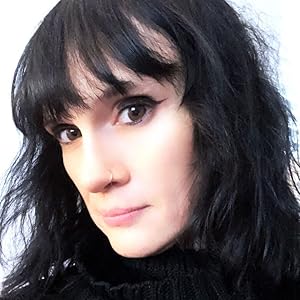
I am a serious and passionate writer, honing my craft for over twenty-five years. I began writing middle grade fiction long ago, moved into YA, and now write adult horror and thriller (as well as poetry). My influences include folklore, mythology, the macabre, obscure monsters, allusion, bizarre connections and coincidences, antiheroes and Byronic heroes, characters with dark secrets and troubled pasts, and anything that makes me question whether “There are older and fouler things than Orcs in the deep places of the world.” I write almost everything with a setting in our world and invite mystery, horror, and magic to intersect with it.
I have great confidence in my ability to craft a well-written, entertaining, fast-paced read, and while my technical skills are strong, please know that I am my own proofreader and editor, and an occasional typo may make its way into my works.
I do have an author website at sqmcgrath dot com where you will find media and links to my socials, if those interest you. I am also active on facebook and instagram at s.q.mcgrath
Interviews on Ginger Nuts of Horror
If you’re a fan of horror literature and cinema, then you absolutely need to check out the horror interview section of Ginger Nuts of Horror.
Firstly, the interviews feature a diverse range of authors, filmmakers, and horror enthusiasts, allowing readers to gain a multifaceted understanding of the genre. Each interview is an opportunity to explore the creative processes, inspirations, and personal stories behind the minds that produce some of the most chilling and thought-provoking works in horror today. From seasoned veterans to up-and-coming talents, the variety of voices ensures that readers can find something that resonates with them.
Moreover, these interviews often delve into the nuances of what makes horror such a compelling genre. Contributors share their thoughts on the psychological aspects of fear, the societal influences on horror trends, and the ways in which horror reflects cultural anxieties. This deeper exploration not only enriches one’s appreciation for horror stories but also fosters discussions about broader themes, such as identity, morality, and existential dread.
The interviews frequently touch on practical advice and industry insights. Writers and creators often share the hurdles they faced in their careers, tips for aspiring horror writers, and the realities of getting published or produced. This wealth of knowledge is invaluable for anyone looking to navigate the sometimes challenging waters of the horror genre. Readers interested in breaking into horror writing or filmmaking will find a treasure trove of wisdom that could pave their path toward success.
Lastly, the community aspect of Ginger Nuts of Horror cannot be overlooked. Engaging with these interviews allows readers to feel connected to a larger community of horror enthusiasts. Comment sections and social media interactions often follow, enabling fans to discuss their thoughts and engage with both the interviewees and fellow readers.
In conclusion, the horror interview section of Ginger Nuts of Horror is an essential resource for anyone interested in the genre. It provides rich insights, guidance, and inspiration that can deepen one’s appreciation for horror while fostering a vibrant community among fans and creators alike. Don’t miss out on the chance to delve into the minds of your favorite horror creators!



